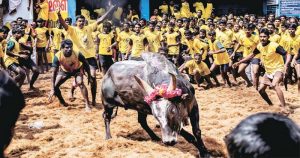
Explained: What Is Jallikattu? What Is The Controversy Around It? All You Need To Know About The Bull-Taming Sport
Many people, celebrities, and politicians of Tamil Nadu are fighting against the ban on Jallikattu. It is strange how a sport—deemed brutal and a violation of animal rights by the activists—and has brought the people of Tamil Nadu together.
Before we start taking sides and pass a judgment, it is important to understand what the sport is all about and why it has come to be so controversial today.
What is Jallikattu?
Jallikattu is known to have its origin in the Indus Valley civilization. It is a traditional bull-taming sport organized in Tamil Nadu during Pongal. The term ‘Jallikattu’, originated from the Tamil words Salli and Kattu, referring to silver or gold coins tied to the bulls’ horns.
Locally it is also known as Eruthazhuvuthal or Manju virattu, the sport involves a natively reared stud that is set free inside an arena filled with young participants. A bag of coins was attached to the hump of the bull, which was for the bull tamer to win if he was successful in his mission.
The challenge lies in taming the bull with bare hands. Ideally, participants try to grab the bull by its hump or horns and wrestle it into submission. The participants are usually young men in their 20s.
While the sport sounds aggressive, it has become an integral part of the Tamilian culture. Dating back to thousands of centuries, its reference can be found in ancient Dravidian literature more than 2000 years old.
When is it held?
It is conducted as a part of Pongal celebrations on Maatu Pongal day (the third day of Pongal festival), the sport was banned by the central government in 2014 and hasn’t been held since the last two years.
Why was it banned?
In 1991 notification, the Environment Ministry added bulls in the list of banning the training and exhibition of bears, monkeys, tigers.
The sport was also challenged by the animal welfare organization like People for the Ethical Treatment of Animals (PETA), Compassion Unlimited plus Action (CUPA), People For Animal and various other animal right groups.
Then, Supreme Court in 2014, passed the ordinance that bulls could not be used as performing animals, either for Jallikattu events or bullock-cart races in the country.
What is the Controversy surrounding Jallikattu?
Supreme Court in its 2014 judgment noted that bulls could not be used as performing animals, either for Jallikattu events or bullock-cart races in Tamil Nadu, Maharashtra or elsewhere in the country.
Reports of cruelty to the animals emerged and several investigations found that the animals were subjected to torture before the event.
Why are Tamilians protesting the Jallikattu ban?
The ban on Jallikattu has turned into an issue of identity for residents of Tamil Nadu. With mass protests staged across Tamil Nadu and many other parts of the world (even as far away as Australia), the issue has become a matter of burning national importance.
As thousands continue to gather at Marina beach in Chennai, Tamil Nadu Chief Minister O. Panneerselvam is set to meet the Chief Minister today to request an ordinance against the ban placed on the sport. So what exactly is the controversy all about and why are Tamilians protesting so widely.
Meanwhile, the political leadership of Tamil Nadu led by the AIADMK and DMK parties blames each other for the current ban on the sport.
However, it must be noted that people from all walks of Tamil society including actors, activists, politicians and members of the civil society are against the ban on the sport. The Jallikattu protests are fuelled by the fact that the ban impinges on the cultural identity of a people.
What do you think of this story? Let us know your views in the comments section below. Like and Share for the ones you care.